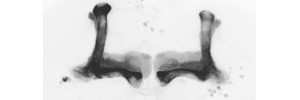15/10/2019
Habituation refers to processes underlying decisions to attend or ignore stimuli, which are pivotal to brain function as they underlie selective attention and learning, but the circuits involved and the molecular mechanisms engaged by the process therein are poorly understood.
Highlights:
We demonstrate that
• Habituation to repetitive footshock involves two phases mediated by distinct neurons of the Drosophila mushroom bodies.
• Btk, a non-receptor Tyrosine Kinase with vertebrate orthologs is required for both phases, but in different mushroom body neurons.
• Habituation failure upon Btk abrogation in neurons where it is required to facilitate the process is readily reversible by the same antipsychotics (risperidone, clozapine) used for schizophrenia patients, which are also characterized by habituation defects.
Overall this study paves the use of Drosophila models for validation of genes identified as schizophrenia-linked in GWAS studies.
Authors: Roussou IG, Papanikolopoulou K, Savakis C, Skoulakis EMC
https://doi.org/10.1523/JNEUROSCI.0633-19.2019
